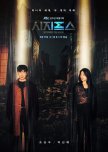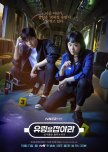
Supernatural theme paired with great acting and both in search for answers mixed with super powers and both have a touch of romance. Best shows of the year

In both dramas main character is judge who doesn't sympathize with the criminals and they give them hardest punishment.

• The ML from My Demon and FL from The Judge from Hell are Demons.
• Both execute the criminals/ bad people.
• Both living amongst humans, fall in love with a human.
• Both depart the souls to Hell
• Both execute the criminals/ bad people.
• Both living amongst humans, fall in love with a human.
• Both depart the souls to Hell

Both female leads have a dose of futility, stubbornness and dominance in their personality and full of extravagance in their appearance. Also, in both fantasy dramas, there's mystery in the plot as they pay for their mistakes in the human world.

PSH plays a similar kickass role in Sisyphus: The Myth. If you like her character here, then I recommend adding Sisyphus to your list.

Ji Ah, a woman who has inherited exorcism abilities from her mother, is the owner of Daebak Realty, a company that specializes in selling haunted houses. Ji Ah looks perfect and is also brilliant, but her hot temper makes her fists fly before her words. One day, Ji Ah encounters a conman named In Beom who specializes in exorcism fraud. Late at night when Daebak Realty operates, In Beom visits Ji Ah to make an offer. He suggests that they team up to exclusively sell houses that are haunted by vengeful spirits and lingering ghosts. Can the two get along well and deal with house prices, ghosts, and their sorrowful stories?

When life, death, and justice collide... two dramas show us the weight of being human.
In two very different corners of the afterlife, Tomorrow and The Judge from Hell bring us stories that are supernatural, emotional, and painfully real.
Both dramas introduce us to teams from the underworld — not collecting souls, but managing human fate. In Tomorrow, grim reapers fight to save the living from choosing death. In The Judge from Hell, a fierce judge from the afterlife returns to Earth to punish the wicked who escaped justice.
At their core, both dramas ask:
What does it mean to live? What does it mean to deserve punishment?
And most importantly: Is there still hope, even in the darkest places?
They deal with real pain — mental health, trauma, abuse, injustice — wrapped in fantasy worlds full of rules, teams, and missions.
Each episode is a mirror to society, showing how humans suffer… and how they survive.
The leads are unforgettable:
Goo Ryun (Tomorrow) carries centuries of sorrow and fights with empathy.
Kang Nan (The Judge from Hell) burns with rage, but her anger comes from love for justice.
Two women. Two missions.
One to save, one to judge.
Both unforgettable.
If Tomorrow is the hand reaching out to stop you from falling…
The Judge from Hell is the fire that makes sure evil pays for what it’s done.
Together, they create a balance — mercy and justice, hope and consequence.
They’ll make you cry, think, and maybe even heal a little.
? Watch if you love:
Fantasy mixed with deep life lessons
Strong, complex female leads
Stories about trauma, justice, and second chances
Emotional healing through dark, beautiful storytelling
In two very different corners of the afterlife, Tomorrow and The Judge from Hell bring us stories that are supernatural, emotional, and painfully real.
Both dramas introduce us to teams from the underworld — not collecting souls, but managing human fate. In Tomorrow, grim reapers fight to save the living from choosing death. In The Judge from Hell, a fierce judge from the afterlife returns to Earth to punish the wicked who escaped justice.
At their core, both dramas ask:
What does it mean to live? What does it mean to deserve punishment?
And most importantly: Is there still hope, even in the darkest places?
They deal with real pain — mental health, trauma, abuse, injustice — wrapped in fantasy worlds full of rules, teams, and missions.
Each episode is a mirror to society, showing how humans suffer… and how they survive.
The leads are unforgettable:
Goo Ryun (Tomorrow) carries centuries of sorrow and fights with empathy.
Kang Nan (The Judge from Hell) burns with rage, but her anger comes from love for justice.
Two women. Two missions.
One to save, one to judge.
Both unforgettable.
If Tomorrow is the hand reaching out to stop you from falling…
The Judge from Hell is the fire that makes sure evil pays for what it’s done.
Together, they create a balance — mercy and justice, hope and consequence.
They’ll make you cry, think, and maybe even heal a little.
? Watch if you love:
Fantasy mixed with deep life lessons
Strong, complex female leads
Stories about trauma, justice, and second chances
Emotional healing through dark, beautiful storytelling


Similiar drastic way of revenge for helpless. Overpower main character with funny sidekick. Many smaller stories in one. The other main lead is detective/prosecutor.



A series where
- someone gives them (bad people) the same suffering they did from their victims
- they die after they receive the punishment
- the soul of the bad people receiving the punishment are going to hell
the differences are:
- In "Judge From Hell", a judge will convict you if you're good to go to hell.
while
- In "Jigoku Shoujo" there's a hotline/website called 'Hell Link' that you need to reach out to at 12mn, you need to type the name of the person who did you wrong and Ai will let you know if she accepts or rejects the human's revenge. The human will form a covenant with Ai (Hell Girl) by untying the scarlet thread from the straw doll's neck. There's also a consequence for humans who form a covenant with Hell Girl.
- someone gives them (bad people) the same suffering they did from their victims
- they die after they receive the punishment
- the soul of the bad people receiving the punishment are going to hell
the differences are:
- In "Judge From Hell", a judge will convict you if you're good to go to hell.
while
- In "Jigoku Shoujo" there's a hotline/website called 'Hell Link' that you need to reach out to at 12mn, you need to type the name of the person who did you wrong and Ai will let you know if she accepts or rejects the human's revenge. The human will form a covenant with Ai (Hell Girl) by untying the scarlet thread from the straw doll's neck. There's also a consequence for humans who form a covenant with Hell Girl.

Both explore the legal genre, although BTB is more legal heavy whereas JFH heavily includes fantasy elements. Both feature romance, however, JFH certainly includes more romance and BTB more so hints at it, but I wouldn’t say it’s the main genre of either. JFH is darker, gothic, and more gory. Both focus on one case per episode usually, although JFH is more about punishing each evildoer whereas BTB focuses on defense. Both explore the morally grey areas in life and provoke the audience to think.

– Both women come from other realms (Joseon/historical ? modern, Hell ? modern).
– Both feature intense, bickering relationships with cold modern men.
– Strong female leads clash with equally powerful male leads (chaebol/lawyer).
– Supernatural women adjusting to life, love, and work in the present day.
– Both women are seen as villains or judges but get a chance to change or be understood.
– Both feature intense, bickering relationships with cold modern men.
– Strong female leads clash with equally powerful male leads (chaebol/lawyer).
– Supernatural women adjusting to life, love, and work in the present day.
– Both women are seen as villains or judges but get a chance to change or be understood.

Sharing similar Christian and law based themes with great acting and plot in both. While TJFH is more fantasy and judgement kind, TFP is more anime-ish and less serious with good action scenes and filled with humour. These have similar vibe despite being different in genre and storytelling. Loving TJFH, then potentially u will like TFP and vice versa.

































